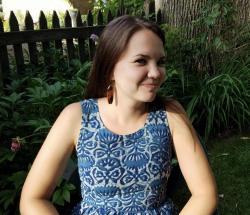In the midst of the coronavirus pandemic, the Writing University has been continuing our series of interviews with writers in the various University of Iowa writing programs. We ask about their work, their process and their descriptions of home. We are posting them now as examples of our shared community strength during this time.
Here is our interview with Translation Workshop MFA candidate Caroline Froh.
Caroline Froh

Caroline Froh just completed her MFA in Literary Translation at the University of Iowa, where she was translating works by Jenish-Swiss writer Mariella Mehr. A 2019 ALTA Travel Fellow, she is also the recipient of a Stanley Award, and will be one of the Provost's Postgraduate Visiting Writers at the University of Iowa for 2020–2021.
1. Do you have a specific project that you will be working on this year?
For roughly the past year and a half, I’ve focused primarily on translating a novel by Mariella Mehr for my MFA thesis. I just submitted that, and my plan now is to continue with some of her other works. Born in Switzerland, Mehr is Jenish, meaning she belongs to a group of travelling people like the Roma and Sinti who have been subjected to extreme subjugation throughout history. In Switzerland (as late as the 1970s) this included forced sterilization, eugenics experiments, and an assimilation program in which children were kidnapped from their families and placed in orphanages or “foster homes,” aka hired out for cheap labor. Much of Mehr’s work is informed by the trauma she endured as a child, and explores themes of violence, especially gendered violence, of belonging and not belonging, and the link between writing and the body.
I’m most excited right now about one of her works of creative nonfiction, Das Licht der Frau (The Light of a Woman), based on a residency in Spain with a close friend who was training to become a female bullfighter. While she advocates for women moving into a historically masculine space, Mehr also understands ceremonial bullfighting to be a vestige of Roman colonization; she traces the bull back to ancient goddess-worshipping cults, and the bullfight to the toppling of these matriarchal societies. This obviously leads to layers of complication between her and her friend.
2. What does your daily practice look like for your writing? Do you have a certain time when you write, or any specific routine?
During the school year, time becomes a rare and precious commodity. That said, I try to be as protective as I can be of my mornings; that’s when I’m most clear and fresh, so I can get the most actual translating and puzzling-out done. Evening is best for editing—the subconscious is starting to take over in preparation for sleep, and I find this allows me to feel the sentences in a different way, more deeply, more instinctively. I need absolute quiet for first and sometimes second drafts, but then background noise actually helps me to focus in the later stages. (The Prairie Lights cafe offers my ambience of choice, and I can’t wait to get back…)
3. What are you currently reading right now? Are you reading for research or pleasure?
With classes wrapping up, I’m shifting to reading for pleasure again. Some books that have been waiting patiently: The Barefoot Woman by Scholastique Mukasonga, translated from the French by Jordan Stump, Erosion, Terry Tempest Williams’ newest essay collection, She Would be King by Wayétu Moore, The Collector of Leftover Souls by Eliane Brum, translated from the Portugese by Diane Grosklaus Whitty, and Recollections of my Nonexistence by Rebecca Solnit. A portion of my attention is also devoted to reading with the purpose of designing a syllabus for a course I’ll be teaching next year, and I’m still always looking for books that parallel or inform my own creative practice in some way (one I continually turn back to is Translation as Transhumance by Mireille Gansel, translated by Ros Schwartz: pure magic).
Reading has also become a welcome new mode of long-distance togetherness during these strange times—I’m currently reading Leslie Marmon Silko’s Almanac of the Dead in tandem with a dear friend who lives in London.
4. What is one thing the readers and writers of Iowa City should know about you and your work?
My work feels like a group effort, it’s sprinkled with lines and phrases offered up by peers in workshop and sentences that sprang open only after being collectively mulled over. I think this is the case with any book. Community will forever be important to my work.
5. Tell us about where you are from -- what are a few of your favorite details about your home?
I’m from the city of Milwaukee, which is directly on Lake Michigan. It wasn’t until I left that I realized just how much my life there was oriented around the water, how much it fed my body and spirit. I try to get to the river when I can here in Iowa City, but rivers just have a different energy. There’s a lot happening in Milwaukee right now, in many areas but especially the arts. Still, the positives about this city aren’t on many people’s radars. In some ways, Milwaukee feels like a secret.
**
Thank you Caroline!